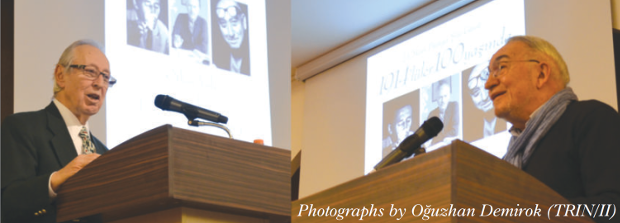BY MER?Ç KURTULU? (EDEB/PhD)

UNESCO’s World Poetry Day was celebrated with an event organized by the Center for Turkish Literature on March 21. Three renowned Turkish poets, all born in 1914—Faz?l Hüsnü Da?larca, Orhan Veli and Oktay R?fat—were commemorated in a special program.
The program opened with a presentation by Prof. Talât Halman, who **************** stated that although 1914, as the year in which World War I began, is generally perceived as ill-fated, it may be regarded as a propitious moment for Turkish poetry because of the birth of these three notable poets. He proceeded to share his reminiscences of Faz?l Hüsnü Da?larca, and expressed his admiration of the latter’s poetry. It should be noted that translations by Prof. Halman will be soon published under the title of one of Da?larca’s poems: “Geceye Kar?? Müdafaa” (Defense Against the Night). In his view, this poem is very significant in terms of understanding Da?larca’s literary concerns, because in it the poet endeavours to protect the mind of the reader against any sense of darkness, malignity or despair. Da?larca in fact wrote thousands of poems, dealing with optimistic themes such as happiness, children and the brightness of the future. Prof. Halman also pointed out that Da?larca should be regarded as one of the most prolific poets of world literature, for he published more than one hundred books containing at least 10 thousand poems on various themes.
Poet and Adjunct Senior Lecturer Hilmi Yavuz then spoke about the poetry of Orhan Veli and Oktay R?fat, drawing attention to the problematization of meaning beginning with the poetry of the post-Tanzimat era. In his view, post-Tanzimat poets such as Ahmet Ha?im preferred to emphasize image, while placing less stress on meaning. In the preface to “Garip,” Orhan Veli problematized this issue again by placing meaning at the center of his poetry. Therefore, stated Mr. Yavuz, this preface may be read as a reaction to the preface by Ahmet Ha?im, “?iir Hakk?nda Baz? Mülahazalar.” However, Orhan Veli’s poetic style changed after the 1940s, and image began to regain importance in his poetry. By defining this transformation as a poetic rupture, Mr. Yavuz asserted that the poet’s real artistic success may be observed in works such as “Denizi Özleyenler ?çin” (Sea Nostalgia). Mr. Yavuz characterized the transformation seen in the poetic style of Oktay R?fat in a similar way and referred to him as a self-renewing master, who questioned his own artistic creativity and style throughout his life.
During the program, Mr. Yavuz read selected poems of Faz?l Hüsnü Da?larca, Orhan Veli and Oktay R?fat in their original Turkish, with Prof. Halman reciting his published English-language translations of the same works. Short visuals of the three poets reading some of their poems were presented as well.
